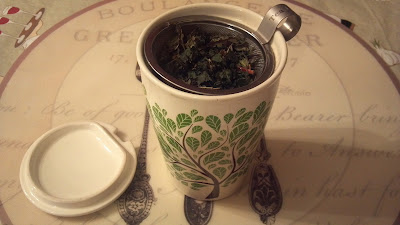As someone who often suffers from achy joints but tries to enjoy an active lifestyle, I often make this tea at the end of a long day to help loosen up those sore muscles and creaky knees. The peppermint came from my own garden, but all the other ingredients came to me courtesy of my good friends at Bazaar Spices. I hope you enjoy this gentle soother as much as I do!
1 teaspoon white willow bark
1 teaspoon birch bark
1 teaspoon peppermint
1 teaspoon stinging nettle leaf
Steep in boiling water for 15 minutes, then drink while warm. If preferred, sweeten with sugar or honey-- but the birch bark is naturally sweet, so you may not need it. Nettle leaf has a very grassy taste, which I enjoy, but if you find that off-putting just reduce that by half.
Both white willow and birch bark contain salicylates, the active pain-relieving component in aspirin. Both herbs can reduce pain and inflammation; white willow is particular effective for back pain and headaches, while birch bark appears to be helpful for joint pain. Stinging nettle is good for just about everything you can think of, but I included it here because it promotes the elimination of uric acid from joints, which can alleviate joint pain. The peppermint is included here largely for flavor and fragrance, but also to mitigate any stomach irritation that might result from ingesting white willow. Peppermint is also beneficial in alleviating menstrual cramps.
If you are allergic to aspirin, or if you are taking medication which is counter-indicated with aspirin, do not try this tea without consulting your physician. Also be aware that both stinging nettle and birch bark are mild diuretics, so be sure to drink a little extra water after enjoying this tea.
If you'd like more information on the medical benefits of herbs, please check out these helpful sites:
http://www.herballegacy.com
http://www.umm.edu/altmed/
http://www.webmd.com/vitamins-supplements/default.aspx
1 teaspoon white willow bark
1 teaspoon birch bark
1 teaspoon peppermint
1 teaspoon stinging nettle leaf
Steep in boiling water for 15 minutes, then drink while warm. If preferred, sweeten with sugar or honey-- but the birch bark is naturally sweet, so you may not need it. Nettle leaf has a very grassy taste, which I enjoy, but if you find that off-putting just reduce that by half.
Both white willow and birch bark contain salicylates, the active pain-relieving component in aspirin. Both herbs can reduce pain and inflammation; white willow is particular effective for back pain and headaches, while birch bark appears to be helpful for joint pain. Stinging nettle is good for just about everything you can think of, but I included it here because it promotes the elimination of uric acid from joints, which can alleviate joint pain. The peppermint is included here largely for flavor and fragrance, but also to mitigate any stomach irritation that might result from ingesting white willow. Peppermint is also beneficial in alleviating menstrual cramps.
If you are allergic to aspirin, or if you are taking medication which is counter-indicated with aspirin, do not try this tea without consulting your physician. Also be aware that both stinging nettle and birch bark are mild diuretics, so be sure to drink a little extra water after enjoying this tea.
If you'd like more information on the medical benefits of herbs, please check out these helpful sites:
http://www.herballegacy.com
http://www.umm.edu/altmed/
http://www.webmd.com/vitamins-supplements/default.aspx


No comments:
Post a Comment